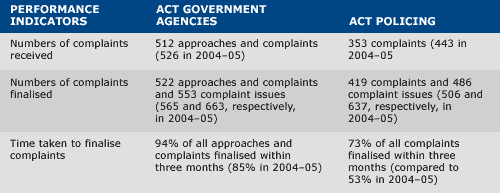Performance
Performance
Analysis of performance
In 2005–06, the ACT Government paid an unaudited total of $933,932 (including GST) to the Ombudsman's office for provision of services. Moneys were received directly from the ACT Government under a memorandum of understanding. Payments (including GST) were for the purposes of the Ombudsman Act 1989 (ACT) ($439,646) and the Complaints (Australian Federal Police) Act 1981 (Cth) ($494,286).
Performance against indicators is shown in Table 1 and provided in more detail in the 'Performance' section under the headings 'Complaints—ACT Government agencies' and 'Complaints—ACT Policing'. The statistical report in Appendix 2 provides details of approaches and complaints received and finalised, and remedies provided to complainants in 2005–06.
TABLE 1 Summary of achievements against performance indicators, 2005–06

The categories of approaches to the office range from simple contacts that can be resolved without investigation through to the formal use of the Ombudsman's powers. Where a complaint involves complex or multiple issues, we conduct a more formal investigation. The decision to investigate a matter more formally can be made for a number of reasons:
- need to gain access to agency records
- nature of the allegations made by a complainant
- time taken by an agency to respond to our requests for information
- likely effect on other people of the issues raised by the complainant.
As well as handling complaints directly, the Ombudsman's office plays a valuable role in referring people to the most appropriate agency to deal with their concerns. Where people have an inquiry or complaint outside the Ombudsman's authority, we try to provide relevant information and contact details to assist them.
In some instances, we refer complainants to other review agencies that can more appropriately deal with the issues they have raised. During the year, these issues included complaints about environment, health and consumer services, as there are special commissioners to deal with these matters. We also received approaches about matters that we are unable to consider because they are outside our jurisdiction, such as complaints about employment conditions.
Approaches and complaints about actions of other police forces were sometimes referred to the relevant state ombudsman, especially where a member of the public was uncertain whether they had interacted with a state police service or the Australian Federal Police.
Training and liaison
The Ombudsman's office attaches great importance to establishing a cooperative and respectful relationship with government agencies and community sector organisations. This is important in the effective and efficient conduct of our complaint investigation role.
ACT Ombudsman staff participated in a number of formal and informal meetings and training sessions with ACT Government and other agencies.
There were fewer activities in 2005–06 than in previous years due to restructuring within the office and staff turnover. Specific activities included:
- continuing to provide input to the Department of Justice and Community Safety on the ACT Prison Project
- participating in the ACT Free Legal Advice Forum and the Complaint Handlers Forum to discuss topical issues in complaints management
- conducting regular meetings with senior staff in ACT Government agencies to provide feedback on complaints received and to ensure complaints are handled smoothly
- commenting on a range of ACT Government and agency submissions and discussion papers raising issues of administrative practice
- meeting quarterly with the AFP's Professional Standards team to discuss issues relevant to the operation of the complaints management system, and meeting weekly with Professional Standards staff to discuss individual complaints and investigations
- conducting an Integrity Investigation Program jointly with the AFP
- attending workshops on reforms to the AFP complaints-handling system
- lecturing on the role of the Ombudsman in police complaints to the Criminal Practices course of the Legal Workshop at the Australian National University
- co-sponsoring a three-year study entitled 'Whistling while they work' on whistleblower protection laws across Australia.
Members of the Ombudsman's Law Enforcement Team continued to assist other integrity bodies from the Asia-Pacific region through presentations to and training of international delegations, particularly in discussing the key aspects of our relationship with the AFP. We hosted a range of international guests this year, including high-level delegations from Bangladesh, Canada, China, India, Indonesia, Korea, Laos, Malaysia, Taiwan and Vietnam.
Service charter standards
We are committed to providing the best service possible. The ACT Ombudsman Service Charter is available on our website at www.ombudsman.act. gov.au. The charter outlines the service that can be expected from the office, ways to provide feedback and steps that can be taken if standards are not met.
Where a complainant disagrees with our conclusions and decision on a complaint, they may ask for the matter to be reconsidered and, if they are still not satisfied, for a review of how the investigation was conducted. A more senior officer not previously involved in the matter will conduct a review, and seek to determine whether the conclusion reached was reasonable, justified and adequately explained to the complainant.
During the reporting period, we received five requests for reviews of our complaint handling. We finalised ten reviews—five of the reviews were carried over from the previous year. The original decision was affirmed in seven complaints; in two cases, we conducted further investigation on the basis of new information provided by the complainant; and in one case the outcome was varied.
Human Rights Act
The ACT Ombudsman continued to work collaboratively with the ACT Human Rights Office on issues concerning the new ACT prison. This contact has naturally led to an exchange of views, information and ideas concerning human rights and the overlapping roles of the Human Rights Commissioner and the Ombudsman in dealing with complaints that touch on issues of human rights. In this way, Ombudsman staff have continued to be involved in human rights issues affecting the ACT community.
Access to government strategy
The Ombudsman recognises the importance of the Access to ACT Government Strategy in ensuring equality of access to the services of the ACT Ombudsman for people with disabilities and eliminating discriminatory practices by staff. We meet our obligations under this strategy through our disability action plan.
The Ombudsman's Disability Action Plan 2005–2008 commits the Ombudsman's office to ensuring that people with disabilities are not disadvantaged when attempting to access the services provided by our organisation. The plan outlines the various approaches we are taking:
- being accessible, with the minimum of formality, to all people who believe they have been adversely affected by defective ACT Government administration, regardless of ethnic or cultural background, sex, language differences or disability
- identifying, and overcoming where possible, barriers which might prevent ready access to the Ombudsman's information and services
- ensuring that the office identifies and understands the priorities and needs of the community (particularly those facing disadvantage).
The office's Occupational Health and Safety Committee is monitoring the plan's implementation.
Community engagement
The Ombudsman's office maintains contact with the community in a variety of formal and informal ways. This aspect of our work is important in raising public awareness of the right to complain to the Ombudsman and building confidence in the role of the office in managing and investigating complaints about ACT Government agencies and ACT Policing.
Significant activities included:
- Contact Canberra 2006 (part of the National Multicultural Festival)—our information stall attracted 350 enquiries (127 enquiries in 2005)
- Youth Week 2006—we operated an information stall to raise awareness about the Ombudsman's office and services.

The Dennis Pearce Competition was expanded in 2005–06 in an attempt to reach a wider range of students in Year 11 and Year 12. Students were asked to produce a television advertisement, create a poster or write an essay about the Ombudsman's role and services.
Aimed at educating young people in the ACT in an entertaining and thought-provoking way about the right of all Australians to complain about unfair treatment by government agencies, the competition was promoted within schools and colleges and through libraries and youth centres. As the response to the competition was disappointing, we are looking at other ways to engage with young people in the ACT in 2006–07.
Members of the office's ACT Ombudsman Team and Law Enforcement Team visited the Belconnen Remand Centre to work with administrative staff to address detainees' concerns. Ombudsman staff again provided induction training for new ACT Correctional Services officers.
In March 2006, the Law Enforcement Team visited the City Watch House to give our staff the opportunity to understand the way in which ACT Policing processes people who are charged with offences or held in custody. We were particularly interested in the closed circuit television (CCTV) and procedures adopted by police in monitoring the CCTV equipment at the City Watch House. Later in 2006, our staff will 'go on the beat' with police on night shift during peak periods. This will afford Ombudsman staff a unique opportunity to gain insight into the challenges that face police on a day-to-day basis.
We will continue to develop this program in 2006–07 by participating in community events and forums, hosting and participating in seminars and workshops, and visiting ACT Government agencies and community, business and professional organisations.
Multicultural framework
The Ombudsman provides information sheets in 29 community languages that set out the role of the Ombudsman and how to make a complaint about a government agency. The languages are Albanian, Amharic, Arabic, Bosnian, Chinese (simplified and traditional), Croatian, Dari, Dutch, Farsi, Filipino, German, Greek, Hindi, Indonesian, Italian, Khmer, Korean, Lao, Macedonian, Pashtu/Pashto, Polish, Russian, Serbian, Sinhalese, Somali, Spanish, Turkish and Vietnamese. The information sheets are available via a link on our website homepage at www.ombudsman.act.gov.au.
In 2005–06, a tendering process was conducted to provide the office with translation, interpreting and transcription services for complainants who do not speak English. A panel of providers has been set up for this purpose.
Aboriginal and Torres Strait Islander reporting
In November 2005, the Ombudsman established an Indigenous Working Group to review the office's service delivery to Indigenous Australians. We recognise that we cannot by ourselves overcome the cultural and other barriers that lead to Aboriginal and Torres Strait Islander people being underrepresented in approaches to the Ombudsman's office. Implementing a culturally appropriate service is a long-term process requiring initiative in addressing issues of concern to Indigenous people and the development of partnerships with Aboriginal and Torres Strait Islander organisations and communities.
The working group is developing a program of consultation with a range of Indigenous groups and individuals. This program is designed to improve our understanding of:
- Indigenous people and communities' experiences with and perceptions of the Ombudsman's office
- forms of communication that work best for Indigenous people who might want to complain to the Ombudsman
- key issues about how government agencies deliver services to Indigenous people and communities.
It is intended that the outcomes of this consultation program will inform the office's handling of complaints from Indigenous Australians and our program of own motion investigations.
ACT Women's Plan
The Ombudsman's office contributes to the achievement of the ACT Women's Plan by:
- promoting the rights of all individuals, including women and girls, to complain about the administrative actions and decisions of government agencies
- providing a flexible, sensitive and responsive complaints service that can deal effectively with complaints from women and girls.
